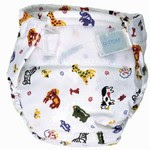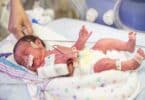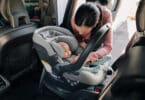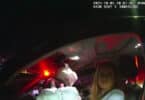Once you have a baby you realize – they consume a lot of energy. Not just your energy, but energy and resources in your home. I am normally a very energy conscious person, but after our son was born our gas and hydro bill soared like we have invited a whole new family to live with us.
We had to change the way our house operated in order to get our energy use back in order.
Here are some tips to help reduce your energy consumption and help with our erroding environmental situation.
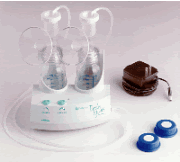 1. Breastfeed
1. Breastfeed
Health benefits aside…breastfeeding is good for the environment. There is no extra packaging from formula cans or bottles. You don’t need to use additional water or energy boiling the water to mix the formula. Your breast pump can be passed along to friends or family when you are done and some milk storage methods are re-usable.
2. Cloth Diapers
Your baby will add 1 ton of waste to the landfill, just from diapers, by the time they are two. One ton of waste that will not breakdown for up to 500 years. I use cloth diapers during the day for my son. I wash them 3 times a week and they seem to work well for us.
There is a misconception that cloth diapers are hard work. If you purchase the all-in-one’s that have the liner and plastic covering already attached they are a breeze. Poopy diapers can be a bit of a pain – especially of your child is not feeling well or not on solids yet, but you can purchase liners to assist with the cleanup.
If you are not sure if cloth is for you – do a trial and purchase enough for a day (5 diapers). Once your child is done with the diaper put it in a bucket with a 1/4 cup vinegar and water. When you are ready to clean them dump the bucket with water and diapers in the washer. Spin it off, start the wash cycle and wash as usual. Cloth diapers can be hung to dry, which will take a while because the large amount of padding or you just use the dryer.
Keeping an open mind is the key. It really isn’t that bad.
3. Make your baby food
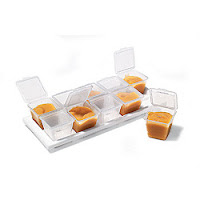 You can eliminate 3-6 glass jars a day by just making your own food for your baby. Aside from the fact that you will be able to control what is put in your child’s food, the cost is much lower for homemade baby food – even if you use organic produce.
You can eliminate 3-6 glass jars a day by just making your own food for your baby. Aside from the fact that you will be able to control what is put in your child’s food, the cost is much lower for homemade baby food – even if you use organic produce.
4. Wash your laundry in cold water
Unless you are cleaning diapers (hot water ALWAYS to kill bacteria), all of laundry will come perfectly clean if you use cold water. You will see a significant drop in your gas bill by switching from warm water washing to cold.
5. Buy One Package Of Compact Fluorescent Light Bulbs
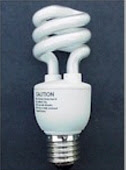 If every American home replaced just one light bulb with a Compact Fluorescent Light Bulb , we would save enough energy to light more than 2.5 million homes for a year and prevent greenhouse gases equivalent to the emissions of nearly 800,000 cars. Could you imagine the impact if you changed 6 or even 8 bulbs in your house? At Costco or Walmart an 8 pack is currently about $13 U.S. These bulbs use at least 2/3 less energy than standard incandescent bulbs to provide the same amount of light, and last up to 10 times longer. To get the most energy savings, replace bulbs where lights are on the most, such as your family and living room, kitchen, dining room, and porch.
If every American home replaced just one light bulb with a Compact Fluorescent Light Bulb , we would save enough energy to light more than 2.5 million homes for a year and prevent greenhouse gases equivalent to the emissions of nearly 800,000 cars. Could you imagine the impact if you changed 6 or even 8 bulbs in your house? At Costco or Walmart an 8 pack is currently about $13 U.S. These bulbs use at least 2/3 less energy than standard incandescent bulbs to provide the same amount of light, and last up to 10 times longer. To get the most energy savings, replace bulbs where lights are on the most, such as your family and living room, kitchen, dining room, and porch.
6. Bring Your Own Bottled Water
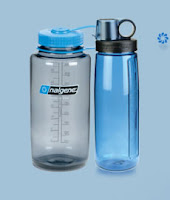 When you buy one liter of water at the store, you’re actually buying about six liters of water. That’s because when manufacturers make plastic bottles, it takes five liters of water to cool the plastic. To save the resources used in creating all those bottles, get a water filter and a reusable aluminum or plastic bottle from a company like Sigg, Nalgene or New Wave Enviro.
When you buy one liter of water at the store, you’re actually buying about six liters of water. That’s because when manufacturers make plastic bottles, it takes five liters of water to cool the plastic. To save the resources used in creating all those bottles, get a water filter and a reusable aluminum or plastic bottle from a company like Sigg, Nalgene or New Wave Enviro.
7. Unplug Appliances, Chargers and Equipment that are not in use
It is a misconception that a stove that is not running or a stereo that is not playing music is not using power. It is called using ‘vampire standby power’. A 2000 study showed that standby power accounted for around 10% of household power-consumption, enough energy to power 18 power stations.
8. Choose Some Toys That Do Not Require Batteries
 In the last year we have gone through a million batteries. Every toy that is made for a young child needs batteries. Last year I did a post on toys that run on high energy, not batteries. Try to find stuff that uses more creativity than electronics. Studies have been done to prove that building blocks teach your child more than electronic toys that flash and sing.
In the last year we have gone through a million batteries. Every toy that is made for a young child needs batteries. Last year I did a post on toys that run on high energy, not batteries. Try to find stuff that uses more creativity than electronics. Studies have been done to prove that building blocks teach your child more than electronic toys that flash and sing.
9. Use All Natural Cleaning Products
Some household products—like bathroom cleaners, disinfectants, floor cleaners and oven cleaners—contain toxic chemicals that can trigger asthma attacks. Shacklee, Seventh Generation and Mrs. Meyer’s Clean Day are a few companies that sell nontoxic household cleaning products. Having natural products around your house will benefit you family in many ways. You won’t have to worry about hazardous chemicals burning your young child’s skin if they get curious and aggravating their lungs. Some of these products may cost more, but their long term benefits are worth it.
Rome wasn’t built on a day, so try to consciously make decisions that will conserve just that little bit each day. Start with turning the water off while you are brushing your teeth, shutting off lights in a non occupied room and then work up to a compost pit. Solar lights instead of power consuming moonrays and recycling over throwing everything the garbage.
Your good examples will show your children that our planet needs to be respected. They will develop good habits early that will hopefully stay with them a lifetime.

